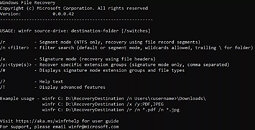Raevenlord
News Editor
- Joined
- Aug 12, 2016
- Messages
- 3,755 (1.20/day)
- Location
- Portugal
| System Name | The Ryzening |
|---|---|
| Processor | AMD Ryzen 9 5900X |
| Motherboard | MSI X570 MAG TOMAHAWK |
| Cooling | Lian Li Galahad 360mm AIO |
| Memory | 32 GB G.Skill Trident Z F4-3733 (4x 8 GB) |
| Video Card(s) | Gigabyte RTX 3070 Ti |
| Storage | Boot: Transcend MTE220S 2TB, Kintson A2000 1TB, Seagate Firewolf Pro 14 TB |
| Display(s) | Acer Nitro VG270UP (1440p 144 Hz IPS) |
| Case | Lian Li O11DX Dynamic White |
| Audio Device(s) | iFi Audio Zen DAC |
| Power Supply | Seasonic Focus+ 750 W |
| Mouse | Cooler Master Masterkeys Lite L |
| Keyboard | Cooler Master Masterkeys Lite L |
| Software | Windows 10 x64 |
Microsoft seems to be on the verge of introducing a new file recovery tool in a future Windows 10 update. The news, courtesy of The verge, paints a MS-DOS-based tool that would allow users to recover most of the "basic" files they'd be looking for after accidental deletion: MP3 files, MP4 videos, PDFs, JPEG images, and Office, Word as well as PowerPoint documents. The File Recovery Tool is already available as a download from Microsoft's app store (and requires Windows 10 version 19041.0 or higher).
The lack of a GUI could be a put-off for some users; but again, this is a free tool from the company. As a refresher, a file isn't fully deleted if you only use Windows' "delete" function - even if you delete it from the Recycle Bin afterwards. All that does is tell the OS that that those particular storage addresses are available for being written to again - the bits that the file is made of are still there. This is the reason why successful file recovery depends mostly on whether or not new information has been written to those particular cells again. If it has, chances to recover your data are slim.

View at TechPowerUp Main Site
The lack of a GUI could be a put-off for some users; but again, this is a free tool from the company. As a refresher, a file isn't fully deleted if you only use Windows' "delete" function - even if you delete it from the Recycle Bin afterwards. All that does is tell the OS that that those particular storage addresses are available for being written to again - the bits that the file is made of are still there. This is the reason why successful file recovery depends mostly on whether or not new information has been written to those particular cells again. If it has, chances to recover your data are slim.

View at TechPowerUp Main Site




 That's why I just couldn't resist and jumped in.
That's why I just couldn't resist and jumped in.